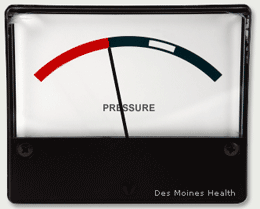Online Stress Test: Calculate stress levels using the Stress Coping Scale*
Posted in Stress Management on September 11, 2011. Last modified on February 01, 2018. Read disclaimer.

Stress can be a real joy-killer. If you're feeling a little too pressured with the demands of work, home, festivities and travel, step back and take a look: are you ignoring your own well being? Since there can be serious health consequences from chronic stress, take this coping quiz to see how well you're handling things.
This stress scale is based on results compiled by clinicians and researchers who tried to identify how people effectively cope with stress. It's an educational tool, designed to help inform you of the most effective and healthy ways to cope.
+ Free Shipping & Returns on Eligible Items.
(*Amazon's Top 100 list updated hourly.)
Enter points for healthy living
In the column to the right give yourself points for various aspects of a well-balanced, healthy life. Adjust the points for your personal situation. In the first item, for example, if you actively pursue a hobby, give yourself the full 10 points. If you have a hobby but do so only halfheartedly, you might give yourself 5 points.Required fields: You must enter some value for every question!
Enter up to 10 points if you actively pursue a hobby.
Enter up to 10 points if you have a supportive family around you.
Enter up to 10 points if you participate in a social or activity group more than once a month.
Enter up to 15 points if you are within 10 pounds of your "ideal" body weight.1
Enter up to 15 points if you practice some form of "deep relaxation" at least five times a week.2
Enter up to 5 points for each time that you exercise for 30 minutes or longer during an average week.
Enter up to 5 points for each nutritionally-balanced and wholesome meal you eat during an average day.3
Enter up to 5 points if you do something you really enjoy, which is "just for you" during an average week.
Enter up to 10 points if you have a place in your home where you can go to relax or be by yourself.
Enter up to 10 points if you practice time management techniques daily.
1 Considering your height and bone structure.
2 Deep relaxation includes meditation, progressive muscle relaxation, imagery and yoga.
3 A nutritionally-balanced meal is low in fat and high in vegetables, fruits and whole-grain products.
SUBTRACT NEGATIVES: Enter points for unhealthy factors
In the column below, enter points for behaviors that don't contribute to your wellness. Adjust the points for your personal situation. In the first item, for example, if you don't smoke an entire pack of cigarettes daily but you do smoke every day, you might enter 5 points, instead of 10 points.– Enter 10 points for each pack of cigarettes you smoke during an average day.
– Enter 5 points for each evening during an average week that you need help sleeping.
– Enter 10 points for each day during an average week that you need help to lower anxiety or calm down.
– Enter 5 points for each evening during an average week that you bring work home.
4 Includes the use any form of medication or chemical substance, including alcohol, to help you sleep.
5 Includes any form of medication or chemical substance, including alcohol, to reduce anxiety or just to calm down.
6 Work meant to be done at your place of employment.
Your stress test number is =
What does your stress test number mean?
Once you've calculated your total score, see where you fall on the scoring scale:
Above 75. Congratulations! You really have a handle on coping with stress, and are doing just about everything you can to keep yourself balanced.
50-75. If you scored in the 50-75 range, you probably have adequate coping skills for most common stress. But, you could give yourself a stress advantage if you paid attention to those one or two challenging areas (and you know what they are).
Below 50. Take a deep breath. Slow down. You need help coping with stress. Your healthcare professional can help steer you in the right direction.
